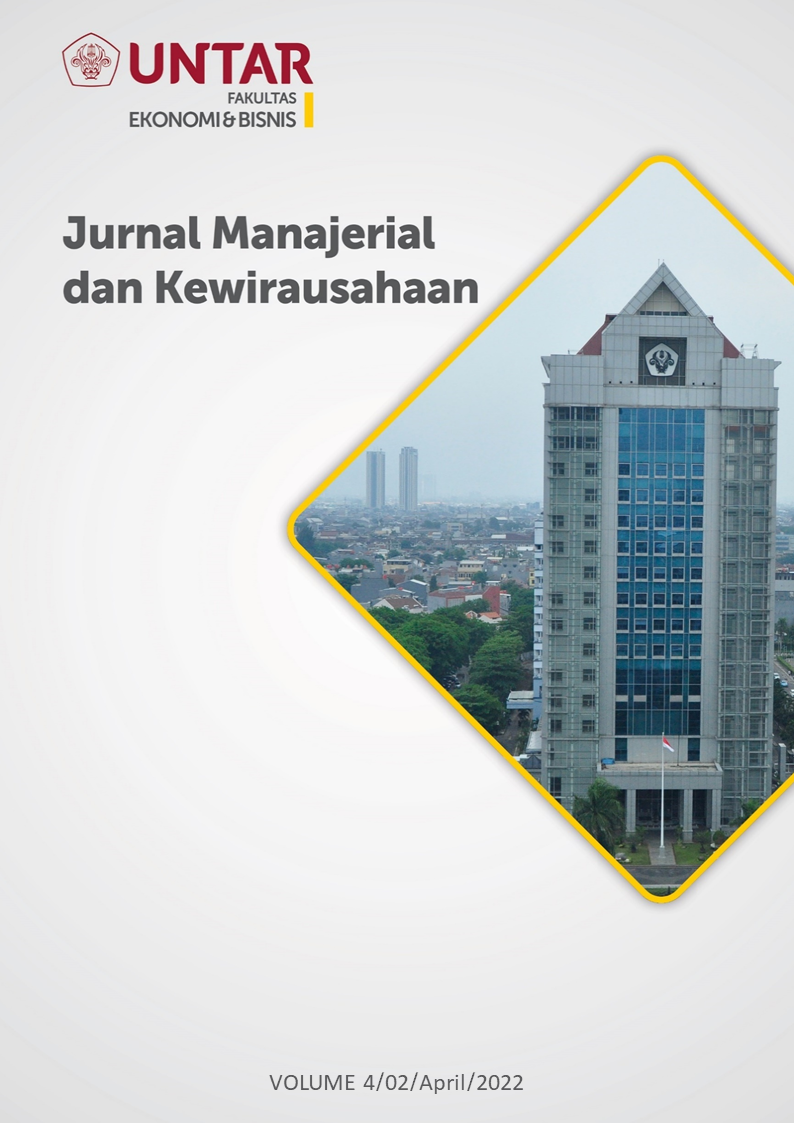Pengaruh Product Quality, Monetary Promotion terhadap Brand Loyalty dengan Satisfaction dan Brand Image sebagai Mediasi
Main Article Content
Abstract
Bisnis coffee shop di Indonesia sedang mengalami pertumbuhan yang pesat dengan diiringi tren konsumsi kopi yang saat ini telah berkembang menjadi gaya hidup masyarakat. Maka dari itu, coffee shop JJ dapat meningkatkan brand loyalty dengan menghadapi homogenitas gaya bisnis untuk mendapatkan beberapa informasi agar loyalitas tetap terjaga. Sampel penelitian ini adalah 100 responden yang merupakan pelanggan JJ di Jakarta. Metode purposive sampling dengan menyebarkan kuesioner secara online yang kemudian diolah dengan menggunakan Smart PLS-SEM. Hasil penelitian ini adalah product quality melalui satisfaction dapat mempengaruhi brand loyalty, selanjutnya monetary promotion melalui brand image dapat mempengaruhi brand loyalty. Product quality dan monetary promotion dapat mempengaruhi brand loyalty melalui satisfaction dan brand image sebagai variabel mediator.
The coffee shop business in Indonesia is experiencing very rapid growth accompanied by the trend of coffee consumption which has now developed into people's lifestyle. Therefore, JJ coffee shop can increase brand loyalty by dealing with the homogeneity of business styles to get some information so that loyalty is maintained. The sample of this research is 100 respondents who are JJ customers in Jakarta. The purposive sampling method is by distributing online questionnaires which are then processed using smartPLS-SEM. The results of this study are product quality through satisfaction can affect brand loyalty, then monetary promotion through brand image can affect brand loyalty. Product quality and monetary promotion can affect brand loyalty through satisfaction and brand image as mediation for JJ customers.
Article Details
Section
This work is licensed under a Jurnal Muara Ilmu Ekonomi dan Bisnis Creative Commons Attribution-ShareAlike 4.0 International License.,/p>
References
Alhaddad, A. (2015). Perceived quality, brand image and brand trust as determinants of brand loyalty. Journal of Research in Business and Management, 3(4), 1-8.
Albari, A. & Kartikasari, A. (2019). The influence of product quality, service quality and price on customer satisfaction and loyalty. Asian Journal of Entrepreneurship and Family Business, 3(1), 49-64.
Bilgin, Y. (2018). The effect of social media marketing activities on brand awareness, brand image and brand loyalty. Business & Management Studies: An International Journal, 6(1), 128-148.
Bowen, J. T. & Chen, S. L. (2001). The relationship between customer loyalty and customer satisfaction. International journal of contemporary hospitality management.
Chang, W. J. (2020). Experiential marketing, brand image and brand loyalty: a case study of Starbucks. British Food Journal.
Chakraborty, U. (2019). The impact of source credible online reviews on purchase intention: The mediating roles of brand equity dimensions. Journal of Research in Interactive Marketing.
Chen, P. T. & Hu, H. H. (2010). The effect of relational benefits on perceived value in relation to customer loyalty: An empirical study in the Australian coffee outlets industry. International journal of hospitality management, 29(3), 405-412.
Gommans, M., Krishman, K. S. & Scheffold, K. B. (2001). From brand loyalty to e-loyalty: A conceptual framework. Journal of Economic & Social Research, 3(1).
Hair, J. F., Ringle, C. M., & Sarstedt, M. (2011). PLS-SEM: Indeed a silver bullet. Journal of Marketing theory and Practice, 19(2), 139-152.
Hoe, L. C. & Mansori, S. (2017). The effects of service quality on customer satisfaction and loyalty: evidence from malaysian engineering industry. International Journal of Advanced Engineering and Management Research, 2.
Huang, H. C., Chang, Y. T., Yeh, C. Y. & Liao, C. W. (2014). Promote the price promotion: The effects of price promotions on customer evaluations in coffee chain stores. International Journal of Contemporary Hospitality Management.
Keni, K., Wilson, N. & Dharmawan, P. (2021). The Impact of Brand Image Towards Loyalty in the Indonesian Smartphone Sector: The Role of Trust as an Intervening Variable. In Ninth International Conference on Entrepreneurship and Business Management, 17(4), 470-478. https://doi.org/10.2991/aebmr.k.210507.070
Kim, S. H., Kim, M. & Lee, S. (2019). The consumer value-based brand citizenship behavior model: Evidence from local and global coffee businesses. Journal of Hospitality Marketing & Management, 28(4), 472-490.
Knox, S. & Walker, D. (2001). Measuring and managing brand loyalty. Journal of strategic marketing, 9(2), 111-128.
Lee, W. S., Moon, J. & Song, M. (2018). Attributes of the coffee shop business related to customer satisfaction. Journal of Foodservice Business Research, 21(6), 628-641.
Liputan 6. (2020). “Cerita Perjuangan Janji Jiwa Bertahan selama Pandemi COVID-19”. https://www.liputan6.com/lifestyle/read/4237024/cerita-perjuangan-janji-jiwa-bertahan-selama-pandemi-corona-covid-19
Malhotra, N. K. (2010). Marketing Research: An applied orientation (6th ed.). Pearson Education.
Mendez, M., Bendixen, M., Abratt, R., Yurova, Y. & O’Leary, B. (2015). Sales promotion and brand loyalty: some new insights. International Journal of Education and Social Science, 2(1), 103-117.
Minten, B., Dereje, M., Engida, E. & Tamru, S. (2018). Tracking the quality premium of certified coffee: Evidence from Ethiopia. World Development, 10(1), 119-132.
Roth, M. S. (1995). Effects of global market conditions on brand image customization and brand performance. Journal of Advertising, 24(4), 55-75.
Sekaran, U. & Bougie, R. (2013). Research methods for business: A skill-building approach (6th ed.). Wiley.
Tjokosaputro, M. & Cokki, C. (2020). The Role of Social Influence Towards Purchase Intention With Value Perception as Mediator: A Study on Starbucks Coffee as an Environmentally Friendly Product. In 8th International Conference of Entrepreneurship and Business Management Untar, 14(5), 183-189. https://doi.org/10.2991/aebmr.k.200626.034

